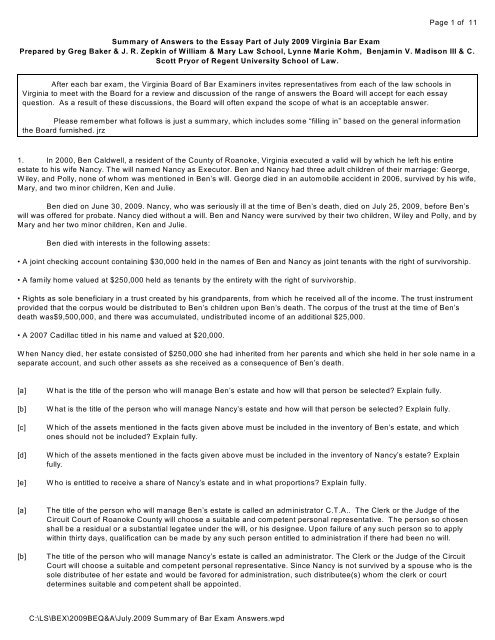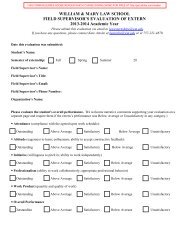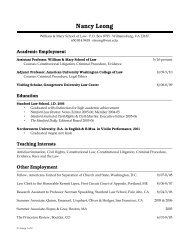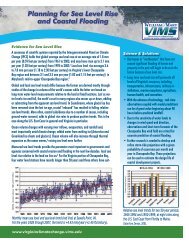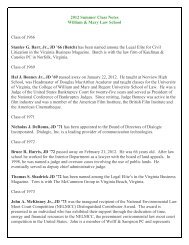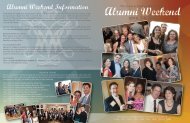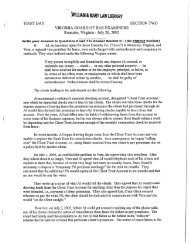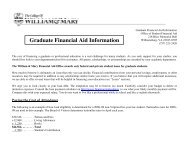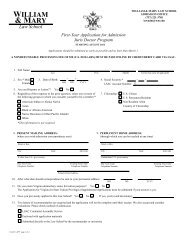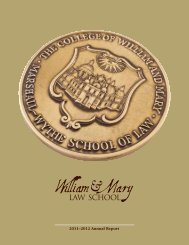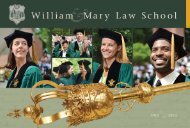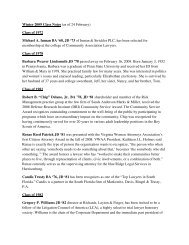Summary of Answers - William & Mary Law
Summary of Answers - William & Mary Law
Summary of Answers - William & Mary Law
Create successful ePaper yourself
Turn your PDF publications into a flip-book with our unique Google optimized e-Paper software.
Page 1 <strong>of</strong> 11<br />
<strong>Summary</strong> <strong>of</strong> <strong>Answers</strong> to the Essay Part <strong>of</strong> July 2009 Virginia Bar Exam<br />
Prepared by Greg Baker & J. R. Zepkin <strong>of</strong> <strong>William</strong> & <strong>Mary</strong> <strong>Law</strong> School, Lynne Marie Kohm, Benjamin V. Madison III & C.<br />
Scott Pryor <strong>of</strong> Regent University School <strong>of</strong> <strong>Law</strong>.<br />
After each bar exam, the Virginia Board <strong>of</strong> Bar Examiners invites representatives from each <strong>of</strong> the law schools in<br />
Virginia to meet with the Board for a review and discussion <strong>of</strong> the range <strong>of</strong> answers the Board will accept for each essay<br />
question. As a result <strong>of</strong> these discussions, the Board will <strong>of</strong>ten expand the scope <strong>of</strong> what is an acceptable answer.<br />
Please remember what follows is just a summary, which includes some “filling in” based on the general information<br />
the Board furnished. jrz<br />
1. In 2000, Ben Caldwell, a resident <strong>of</strong> the County <strong>of</strong> Roanoke, Virginia executed a valid will by which he left his entire<br />
estate to his wife Nancy. The will named Nancy as Executor. Ben and Nancy had three adult children <strong>of</strong> their marriage: George,<br />
W iley, and Polly, none <strong>of</strong> whom was mentioned in Ben’s will. George died in an automobile accident in 2006, survived by his wife,<br />
<strong>Mary</strong>, and two minor children, Ken and Julie.<br />
Ben died on June 30, 2009. Nancy, who was seriously ill at the time <strong>of</strong> Ben’s death, died on July 25, 2009, before Ben’s<br />
will was <strong>of</strong>fered for probate. Nancy died without a will. Ben and Nancy were survived by their two children, W iley and Polly, and by<br />
<strong>Mary</strong> and her two minor children, Ken and Julie.<br />
Ben died with interests in the following assets:<br />
• A joint checking account containing $30,000 held in the names <strong>of</strong> Ben and Nancy as joint tenants with the right <strong>of</strong> survivorship.<br />
• A family home valued at $250,000 held as tenants by the entirety with the right <strong>of</strong> survivorship.<br />
• Rights as sole beneficiary in a trust created by his grandparents, from which he received all <strong>of</strong> the income. The trust instrument<br />
provided that the corpus would be distributed to Ben’s children upon Ben’s death. The corpus <strong>of</strong> the trust at the time <strong>of</strong> Ben’s<br />
death was$9,500,000, and there was accumulated, undistributed income <strong>of</strong> an additional $25,000.<br />
• A 2007 Cadillac titled in his name and valued at $20,000.<br />
W hen Nancy died, her estate consisted <strong>of</strong> $250,000 she had inherited from her parents and which she held in her sole name in a<br />
separate account, and such other assets as she received as a consequence <strong>of</strong> Ben’s death.<br />
[a]<br />
[b]<br />
[c]<br />
[d]<br />
]e]<br />
W hat is the title <strong>of</strong> the person who will manage Ben’s estate and how will that person be selected Explain fully.<br />
W hat is the title <strong>of</strong> the person who will manage Nancy’s estate and how will that person be selected Explain fully.<br />
W hich <strong>of</strong> the assets mentioned in the facts given above must be included in the inventory <strong>of</strong> Ben’s estate, and which<br />
ones should not be included Explain fully.<br />
W hich <strong>of</strong> the assets mentioned in the facts given above must be included in the inventory <strong>of</strong> Nancy’s estate Explain<br />
fully.<br />
W ho is entitled to receive a share <strong>of</strong> Nancy’s estate and in what proportions Explain fully.<br />
[a]<br />
[b]<br />
The title <strong>of</strong> the person who will manage Ben’s estate is called an administrator C.T.A.. The Clerk or the Judge <strong>of</strong> the<br />
Circuit Court <strong>of</strong> Roanoke County will choose a suitable and competent personal representative. The person so chosen<br />
shall be a residual or a substantial legatee under the will, or his designee. Upon failure <strong>of</strong> any such person so to apply<br />
within thirty days, qualification can be made by any such person entitled to administration if there had been no will.<br />
The title <strong>of</strong> the person who will manage Nancy’s estate is called an administrator. The Clerk or the Judge <strong>of</strong> the Circuit<br />
Court will choose a suitable and competent personal representative. Since Nancy is not survived by a spouse who is the<br />
sole distributee <strong>of</strong> her estate and would be favored for administration, such distributee(s) whom the clerk or court<br />
determines suitable and competent shall be appointed.<br />
C:\LS\BEX\2009BEQ&A\July.2009 <strong>Summary</strong> <strong>of</strong> Bar Exam <strong>Answers</strong>.wpd
Page 2 <strong>of</strong> 11<br />
[c]<br />
The only assets that must be included in Ben’s estate inventory is the 2007 Cadillac and the undistributed trust income in<br />
the amount <strong>of</strong> $25,000. His other property passed per the terms <strong>of</strong> how he held title.<br />
[d] The value <strong>of</strong> the joint checking account at the time <strong>of</strong> Nancy’s death, the value <strong>of</strong> the family home, and the $250,000 she<br />
inherited from her parents should be included in Nancy’s estate inventory.<br />
[e]<br />
Nancy died intestate and Va. Code §64.1-1establishes the course <strong>of</strong> intestate succession. W iley & Polly would each<br />
take 1/3 <strong>of</strong> her estate and Ken & Julie will divide evenly the 1/3 share <strong>of</strong> their deceased father. §64.1-3.<br />
2. Tony, a self-employed building contractor, owned three parcels <strong>of</strong> real property in Bristol, Virginia. The parcels had been<br />
appraised by an independent appraiser at a value <strong>of</strong>$125,000 each. They were assessed for taxation purposes by the City <strong>of</strong><br />
Bristol at $90,000 each. Title to Parcel 1 was held by Tony and his wife, Paula, as tenants by the entireties. The other parcels<br />
were unencumbered and owned by Tony in fee simple.<br />
Tony’s contracting business had slowed to a halt. Aside from the parcels, Tony has no assets other than some building<br />
equipment, and he relies for living expenses on Paula’s salary as a librarian at the Bristol Public Library. He owes creditors<br />
cumulatively $300,000, including $200,000 he owes to the Bank <strong>of</strong> Commerce (“Bank”). Bank had lately been pressing Tony to<br />
reduce the debt.<br />
On April 15, Tony received a letter from Bank’s attorney demanding that Tony either make a“substantial payment” on the<br />
outstanding balance or give Bank deeds <strong>of</strong> trust on the three parcels as security for the debt.<br />
$500.<br />
On April 30, Tony and Paula executed and recorded a deed conveying Parcel 1 to Paula in exchange for a payment <strong>of</strong><br />
On May 1, when Bank learned <strong>of</strong> this transaction, it commenced suit to recover the full $200,000 owed by Tony.<br />
On May 5, Tony executed a deed <strong>of</strong> trust on Parcel 2 in favor <strong>of</strong> his father to secure a$45,000 unpaid loan that his father<br />
had made to him two years earlier.<br />
Also on May 5, Tony conveyed Parcel 3 to his friend, Alfred, in exchange for a promissory note for $100,000 payable in a<br />
single lump sum payment due five years from the date <strong>of</strong> the note. In the deed <strong>of</strong> conveyance, Tony retained the right to<br />
repurchase Parcel 3 for $100,000 at any time during the same five years.<br />
Bank then amended its complaint to pray for an order setting aside the deed to Paula on Parcel 1, the deed <strong>of</strong> trust to<br />
Tony’s father on Parcel 2, and the deed to Alfred on Parcel 3. In his answer, Tony denied that Bank has the right to have those<br />
conveyances set aside.<br />
W hat arguments should Bank make in support <strong>of</strong> its prayer to set aside each <strong>of</strong> the conveyances, what arguments<br />
should Tony make in opposition, and how should the court rule on each Explain fully.<br />
Arguments the Bank should make are:<br />
[i] The conveyances <strong>of</strong> Parcel 1 to Paula, the conveyance <strong>of</strong> a deed <strong>of</strong> trust on Parcel 2 in favor <strong>of</strong> his Dad, without<br />
any additional consideration and the conveyance <strong>of</strong> Parcel 3 to his friend were all made with the intent to hinder<br />
and defraud his creditors and under Va. Code 55-80, the Bank is entitled to the court’s setting aside the<br />
conveyance and making the property subject to the Bank’s claims.<br />
[ii]<br />
Tony would argue that as a debtor, under Virginia law, he’s entitled to prefer one creditor over another. He<br />
should also argue, as to Parcel 1, that since it was held with Paula as Tenants by the Entirety, it was immune<br />
from the reach <strong>of</strong> a creditor <strong>of</strong> just him and that the court should not set aside the transfer <strong>of</strong> Parcel 1.<br />
The BBE thought the claim <strong>of</strong> fraud as to Parcels 2 & 3 was correct and that Tony was correct in his argument as to<br />
Parcel 1. The BBE would give some credit for an answer that argued only that the conveyances <strong>of</strong> Parcels 2 & 3 were voluntary<br />
conveyances, under Va. Code §55-81, by an insolvent debtor or a debtor that became insolvent as a result <strong>of</strong> the conveyances.<br />
In order to get full credit the applicant would need to conclude that the conveyances <strong>of</strong> Parcel 2 & 3 were fraudulent and a<br />
discussion <strong>of</strong> the voluntary conveyance was not necessary in order to get full credit for a well discussed and reasoned answer<br />
based solely on a fraudulent conveyance theory. Lastly, the BBE thought Tony’s argument about Parcel 1 and it being immune<br />
from the Banks’ reach was correct.<br />
C:\LS\BEX\2009BEQ&A\July.2009 <strong>Summary</strong> <strong>of</strong> Bar Exam <strong>Answers</strong>.wpd
Page 3 <strong>of</strong> 11<br />
3. On New Year’s Eve, Officer Bradford responded to the site <strong>of</strong> an automobile accident on a state highway in the City <strong>of</strong><br />
Covington, Virginia. The driver <strong>of</strong> one <strong>of</strong> the cars was severely injured and had been taken by ambulance to the nearest hospital.<br />
Jabo, the driver <strong>of</strong> the other car, was still at the scene <strong>of</strong> the accident. W hen Officer Bradford asked Jabo for his driver’s license,<br />
Jabo produced a picture ID card and explained sheepishly that his driver’s license had been suspended for 90 days three weeks<br />
earlier and that the car he was driving belonged to his next door neighbor, who had lent it to him so he could take his pet dog to<br />
the veterinarian. The dog had suffered a broken hind leg when a car ran over it.<br />
Officer Bradford then administratively impounded the car Jabo was driving and issued a citation and summons, charging<br />
Jabo with a violation <strong>of</strong> the following Virginia statute:<br />
Section 46: Driving while license suspended. (A) No resident whose driver’s license has<br />
been suspended shall thereafter drive a motor vehicle on any highway in the Commonwealth<br />
until the period <strong>of</strong> such suspension has terminated. Violation <strong>of</strong> this subsection is a<br />
misdemeanor, the penalty for which shall be a term <strong>of</strong> confinement <strong>of</strong> 10 days in jail, except that<br />
the court shall not impose the minimum term <strong>of</strong> confinement for violation <strong>of</strong> this subsection<br />
where operation <strong>of</strong> the motor vehicle occurred in a situation <strong>of</strong> apparent extreme emergency<br />
which requires such operation to save life or limb.<br />
(B) In addition to any other penalty provided by this section, any motor vehicle that has been<br />
administratively impounded may in the discretion <strong>of</strong> the court be impounded for an additional<br />
period <strong>of</strong> up to 90 days. However, if at the time <strong>of</strong> the violation the <strong>of</strong>fender was driving a motor<br />
vehicle owned by another person, the court shall have no jurisdiction over such motor vehicle.<br />
(C) Upon conviction <strong>of</strong> a violation <strong>of</strong> subsection A, the court shall suspend the person’s driver’s<br />
license for an additional period equal to the period for which it had been previously suspended.<br />
On January 30, Jabo appeared before the Covington General District Court. Officer Bradford testified as to what Jabo<br />
had told him at the scene <strong>of</strong> the accident. Jabo then entered a plea <strong>of</strong> guilty to the <strong>of</strong>fense, a misdemeanor. The court imposed a<br />
10-day jail sentence, ordered the car impounded for an additional 90 days, and suspended Jabo’s license for an additional 90<br />
days.<br />
Jabo’s attorney filed a motion to vacate the court’s imposition <strong>of</strong> the 10-day jail sentence, the impoundment <strong>of</strong> the car,<br />
and the additional 90-day suspension on the ground that each <strong>of</strong> those actions exceeded the court’s power under Section 46.<br />
Following Jabo’s conviction, Officer Bradford discovered that Jabo had previously been convicted <strong>of</strong> driving under the<br />
influence and had been adjudicated an habitual <strong>of</strong>fender.<br />
The Commonwealth’s Attorney indicted Jabo for violation <strong>of</strong> the following Virginia statute:<br />
Section 48: Operation <strong>of</strong> a motor vehicle by an habitual <strong>of</strong>fender prohibited. (A) It shall be<br />
unlawful for any person adjudicated an habitual <strong>of</strong>fender to drive any motor vehicle on the<br />
highways <strong>of</strong> the Commonwealth while the revocation or suspension <strong>of</strong> the person’s driving<br />
privilege remains in effect.<br />
(B) Any person found to be an habitual <strong>of</strong>fender under this article, who is thereafter convicted <strong>of</strong><br />
driving a motor vehicle in the Commonwealth while the revocation or suspension determination<br />
is in effect shall be punished as follows:<br />
* * *<br />
(2) If such driving <strong>of</strong> itself endangers the life, limb, or property <strong>of</strong> another and the person has<br />
previously been convicted <strong>of</strong> driving while under the influence, such person shall be guilty <strong>of</strong> a<br />
felony punishable by confinement in a state correctional facility for not less than one year nor<br />
more than five years.<br />
At the commencement in the Covington Circuit Court <strong>of</strong> Jabo’s trial on the indictment, after the first juror was sworn,<br />
Jabo’s attorney introduced evidence <strong>of</strong> Jabo’s conviction under Section 46in the General District Court and moved to dismiss the<br />
indictment on the ground that trial on the Section 48 charges unlawfully subjected Jabo to double jeopardy.<br />
(a)<br />
How should the General District Court rule on each part <strong>of</strong> Jabo’s motion to vacate Explain fully.<br />
C:\LS\BEX\2009BEQ&A\July.2009 <strong>Summary</strong> <strong>of</strong> Bar Exam <strong>Answers</strong>.wpd
Page 4 <strong>of</strong> 11<br />
(b)<br />
How should the Circuit Court rule on Jabo’s motion to dismiss the indictment Explain fully.<br />
This is what the BBE describe as a “performance” question and what they are looking for is how well the applicant can<br />
discuss and analyze a set <strong>of</strong> facts and apply a particular law, as given in the problem. The answer is graded based on how well<br />
the applicant can apply the law to the given facts.<br />
[a] [i] Given the language <strong>of</strong> Section 46 as given in the problem, the BBE thought that the language “... situation <strong>of</strong><br />
apparent extreme emergency which requires such operation to save life or limb.” applied only to human life and not to<br />
the life <strong>of</strong> a dog. They thought the “life or limb” clearly mean a human. Thus the correct answer was that the court<br />
properly imposed the 10 day jail sentence.<br />
[ii] The court, by virtue <strong>of</strong> Section 46 (B), in the last sentence was deprived <strong>of</strong> authority to order extended<br />
impoundment <strong>of</strong> the vehicle because the vehicle was owned by another person.<br />
[iii] As to the additional period <strong>of</strong> suspension <strong>of</strong> Jabo’s license, based on the rationale under [i] the exception applied<br />
only to humans and thus the conviction was proper and the additional suspension was proper.<br />
[b]<br />
On Jabo’s motion to dismiss the indictment based on double jeopardy, there was considerable discussion. The BBE<br />
definitely wanted the applicant to recognize the applicability <strong>of</strong> the Blockburger test for double jeopardy as set forth in<br />
Blockburger v. U.S. 284 U.S. 299. The discussion with the BBE focused on the holding in Blockburger that double<br />
jeopardy does not apply where each <strong>of</strong>fense has an element that the other does not. Under the holding in Johnson v.<br />
Commonwealth 38 Va. App. 137, the Court <strong>of</strong> Appeals <strong>of</strong> Virginia recognized that the element <strong>of</strong> being prohibited from<br />
driving because you are suspended was different from the element <strong>of</strong> being prohibited from driving because you’ve been<br />
declared a habitual <strong>of</strong>fender. It is probable that an applicant that correctly recognizes the holding <strong>of</strong> Blockburger without<br />
more will get full or substantial credit. It appeared that after the discussion the BBE were concerned whether it would be<br />
unfair to require an applicant’s answer to go further than that.<br />
The BBE were not looking for an analysis under Va. Code §19,2-274.<br />
4. Paula Pane, a thirty-two year old mother <strong>of</strong> three children, was injured in a vehicular collision in Fairfax, Virginia when her<br />
automobile was struck from behind by an expensive sports car operated by Ronny Church. Ronny is a notorious raconteur whose<br />
name <strong>of</strong>ten appears in local newspaper gossip columns and who was once quoted as having said, “I’ve never worked a day in<br />
my life, and I’m proud <strong>of</strong> it.” Ronny had inherited a sizeable fortune and, in fact, had never worked.<br />
Paula sued Ronny in the Circuit Court <strong>of</strong> Fairfax County, Virginia for $500,000 in compensatory damages and $350,000<br />
in punitive damages, alleging that Ronny’s gross negligence in operating his own motor vehicle was the proximate cause <strong>of</strong> the<br />
collision, which resulted in her personal injuries, including the pain and suffering she has experienced. Ronny denied liability, and<br />
the case proceeded to trial before a jury. The property damage claims had been settled separately by the parties’ insurance<br />
companies.<br />
At trial, the evidence established the following facts: Paula was stopped in the correct lane waiting to make a proper turn<br />
when Ronny’s car struck hers. Immediately prior to the time <strong>of</strong> collision, Ronny was exceeding the posted speed limit by at least<br />
10 miles per hour and was abruptly changing lanes. Paula’s physician testified that Paula suffered a sprain <strong>of</strong> the muscles and<br />
the ligaments involving the neck and upper back, that there were no broken bones, but that, because <strong>of</strong> extreme discomfort,<br />
Paula was required to wear a foam collar, take pain medication, and undergo physical therapy for several months. He did not feel<br />
that she had any permanent disability and that as <strong>of</strong> the trial date she had no symptoms relative to her injured area. Paula’s out<strong>of</strong>-pocket<br />
expenses in connection with her injuries were $6,755, almost all <strong>of</strong> which represented the cost <strong>of</strong> medication,<br />
hospitalization, and healthcare provider fees. As Paula was unemployed, there was no claim for lost wages.<br />
During a recess on the first day <strong>of</strong> the two-day trial, Frank, Paula’s father, forgetting momentarily the general admonition<br />
<strong>of</strong> the trial judge, which was announced to all witnesses and parties, not to converse with any juror until the case is over, struck<br />
up a conversation with one juror about the weather and gardening. At one point during that conversation, Frank lamented that<br />
he“just hadn’t time this year to do everything I regularly do in the garden, because I’ve been babysitting the grand kids pretty<br />
much full time since Paula’s accident.”<br />
The jury deliberated for less than an hour and returned a verdict for $450,000 in compensatory damages and $350,000<br />
in punitive damages.<br />
In interviewing a juror after the trial, Ronny learned that the verdict had been based on a vote <strong>of</strong> six to one. The<br />
C:\LS\BEX\2009BEQ&A\July.2009 <strong>Summary</strong> <strong>of</strong> Bar Exam <strong>Answers</strong>.wpd
Page 5 <strong>of</strong> 11<br />
dissenting juror, who was the one Ronny interviewed, said that, although she agreed with all the other jurors that Ronny had been<br />
grossly negligent, she had “refused to go along because the amount was way out <strong>of</strong> line only because <strong>of</strong> Ronny’s reputation as a<br />
rich playboy.” This juror also told Ronny about Frank’s conversation with one <strong>of</strong> the other jurors.<br />
Based on this information, Ronny timely filed the following motions asking for a new trial on all issues, including liability<br />
and damages:<br />
[1] For a new trial on the ground that the jury’s verdict was not unanimous;<br />
[2] For a new trial on the ground <strong>of</strong> Frank’s conversation with one <strong>of</strong> the jurors; and<br />
[3] For a new trial on the ground that the verdict was excessive.<br />
The judge asks you, as her law clerk, to prepare a memorandum explaining fully your answers to the following questions:<br />
[a]<br />
[b]<br />
[c]<br />
[d]<br />
Must the court grant a new trial based on the less-than-unanimous verdict<br />
Must the court grant a new trial because <strong>of</strong> Frank’s conversation with the juror<br />
W hat is the standard for making the determination that a verdict is excessive, and, in the event the court determines that<br />
the verdict was, in fact, excessive, must the court grant a new trial, or does it have any other options<br />
In the event the court grants a new trial solely on the ground that the verdict was excessive, should the court grant the<br />
new trial on all issues or should it limit the new trial to the issue <strong>of</strong> damages<br />
[a] Yes the court must grant a new trial. Jury verdicts must be unanimous. Counts v. Commonwealth 137 Va. 744.<br />
[b]<br />
[c]<br />
[d]<br />
Applicant should recognized that the mere fact <strong>of</strong> the conversation does not mean a new trial must be granted. The<br />
judge should determine what was said and if it affected the jury’s deliberations. It was not necessary for the applicant to<br />
discuss the law regarding when the judge can or should examine the jurors about their deliberations.<br />
The standard for deciding if the jury’s verdict is excessive is described as whether it “shocks the conscience <strong>of</strong> the court”.<br />
If it does, the judge can put the plaintiff on terms to accept a reduced judgment or the judge will order a new trial.<br />
If the court decides to grant a new trial, it’s a discretionary call whether to order a new trial on all issues, or just on the<br />
amount <strong>of</strong> damages. The court should consider whether the amount <strong>of</strong> the verdict is so excessive as to suggest that the<br />
jury was prejudiced by bias against Ronny because <strong>of</strong> his wealth and lifestyle. The BBE thought the better call was to<br />
order a new trial on damages only, but would accept either conclusion, if well argued by the applicant.<br />
5. Maddy, who recently graduated from college and is joining her friend Sophia on a celebratory, two-week vacation trip to<br />
Europe, left her automobile at the home <strong>of</strong> Sophia’s parents in Vienna, Virginia, since that is reasonably convenient to Dulles<br />
International Airport. As Maddy and Sophia were leaving for the airport, Maddy handed over her automobile keys to Sophia’s<br />
father, AJ, asking him to “keep an eye on my car” and saying he could move it “if necessary” while she and Sophia were traveling<br />
out <strong>of</strong> the country.<br />
Several days later, AJ, who was frustrated that the egress for his own automobile to exit from his driveway was blocked<br />
by a repairman’s van, drove Maddy’s automobile to work. Because he was late for a meeting and not thinking about what he was<br />
doing, AJ inadvertently parked Maddy’s automobile in a “no parking/towing enforced” zone in the parking garage connected to the<br />
<strong>of</strong>fice building where he worked.<br />
W hen AJ returned that evening to where he had parked Maddy’s automobile, he learned that it had been towed by Bud’s<br />
Towing, an independent contractor retained by Office Building Corporation (“OBC”), the owner <strong>of</strong> the <strong>of</strong>fice building and parking<br />
garage.<br />
AJ went to Bud’s impoundment lot in Vienna, Virginia and paid the towing fee to Bud. AJ received a receipt, which<br />
authorized release <strong>of</strong> the car to him. As AJ began to drive <strong>of</strong>f the towing company’s property, he noticed that the automobile’s<br />
radio was missing. Because AJ had listened to the radio that morning on the way to work, he knew that it must have been in the<br />
car when he parked it. In fact, the radio had been removed while the car was in Bud’s possession. W hen AJ confronted Bud and<br />
demanded that the radio be replaced, Bud said “Listen, once I park a car in my storage lot, I don’t pay attention to it any more<br />
C:\LS\BEX\2009BEQ&A\July.2009 <strong>Summary</strong> <strong>of</strong> Bar Exam <strong>Answers</strong>.wpd
Page 6 <strong>of</strong> 11<br />
after that. If you’re towed from a no parking zone to my place, it’s your problem.” W hen AJ began to protest, Bud, who is the sole<br />
owner <strong>of</strong> the towing company, just grinned and pointed to the language on the back <strong>of</strong> AJ’s receipt for the towing charges, which<br />
stated:<br />
AJ asks you the following questions:<br />
“Bud’s Towing is not responsible for loss or damages to your property, no<br />
matter what the reason. Have a nice day."<br />
[a]<br />
[b]<br />
[c]<br />
Does AJ have any liability to Maddy for the missing radio Explain fully.<br />
Does Bud’s Towing have any liability for the missing radio Explain fully.<br />
Does OBC have any liability for the missing radio<br />
[a]<br />
[b]<br />
[c]<br />
Applicant should show recognition that this started <strong>of</strong>f as a gratuitous bailment and AJ would have been liable only for<br />
gross negligence. Applicant should discuss whether, when AJ used the car, the bailment became one for mutual benefit,<br />
in which AJ would be liable for ordinary negligence and whether parking in a no parking zone was negligence.<br />
Discussion should also include the analysis that when AJ used the car to go to work, he exceeded the scope <strong>of</strong> the<br />
bailment which is treated as a conversion and the bailee becomes absolutely liable. All <strong>of</strong> the foregoing must be<br />
discussed in order to gain full credit.<br />
Bud’s Towing owes Maddy a duty <strong>of</strong> ordinary care and can not contract away liability for breach <strong>of</strong> this duty. Also, the<br />
disclaimer was on the back <strong>of</strong> the receipt for the towing charges, which was not part <strong>of</strong> any contract and was given after<br />
AJ had paid for the release <strong>of</strong> the car.<br />
OBJ only possibility <strong>of</strong> liability would be under a theory <strong>of</strong> vicarious liability, but on the facts given, Bud was an<br />
independent contractor.<br />
6. Brad, who worked for many years as General Manager <strong>of</strong> Acme Motors, a pr<strong>of</strong>itable automobile dealership in Suffolk,<br />
Virginia, was <strong>of</strong>fered the opportunity to purchase the dealership. Brad was interested but did not have the necessary funds. He<br />
contacted his childhood friend, Sam, a successful and wealthy real estate developer, for advice on how to go about raising the<br />
capital. Sam suggested that they purchase Acme Motors together. Brad agreed.<br />
Brad and Sam orally agreed that Sam would put up the money necessary to make the purchase, that Brad would<br />
manage the day-to-day operation <strong>of</strong> the business, that Sam would arrange the finances, and that, although Sam would not<br />
actively work at the dealership, they would share the pr<strong>of</strong>its equally.<br />
After consummating the deal with the prior owner <strong>of</strong> the dealership, Sam applied for a business license, listing the entity<br />
as a partnership named New Acme Motors, LTD, whose partners were Brad and Sam. Sam also opened a line <strong>of</strong> credit and a<br />
business account at First Bank in the name <strong>of</strong> New Acme Motors, LTD, and they started doing business under the new name.<br />
Suzie, who had recently inherited a substantial amount <strong>of</strong> money from her father, went to the New Acme Motors to buy a<br />
new car. She had known Brad for many years, and she knew that Sam and Brad were partners in New Acme Motors. In<br />
conversation with Brad, Suzie said she was looking for ways to invest her inheritance. Brad said he was about to draw<br />
$50,000from a credit line at First Bank to finance his inventory but that, if Suzie were interested, he would <strong>of</strong>fer her a favorable<br />
rate <strong>of</strong> interest and borrow the money from her rather than from the bank. Suzie agreed, so she wrote a check in the amount <strong>of</strong><br />
$50,000 payable to Brad. In turn, Brad gave Suzie a promissory note payable in one year bearing interest at the rate <strong>of</strong> 10%.<br />
Brad signed the note, “New Acme Motors, LTD, by Brad.” Brad deposited the check in Acme’s business account at First Bank<br />
and eventually used the money to finance inventory.<br />
A month later, Sam and Brad retained a lawyer to prepare a written partnership agreement, which contained the terms to<br />
which they had originally agreed. The written agreement was not filed with the State Corporation Commission.<br />
A year later, the sale <strong>of</strong> automobiles began to decline precipitously. Sam sent Brad a letter that stated, “This is to advise<br />
you that I hereby terminate and withdraw from our partnership in New Acme Motors, LTD.”<br />
Brad acknowledged Sam’s letter, and Brad continued to work for three months, winding up the business. Neither Brad<br />
nor Sam told First Bank about Sam’s decision to terminate the partnership. During those three months, Brad drew another<br />
C:\LS\BEX\2009BEQ&A\July.2009 <strong>Summary</strong> <strong>of</strong> Bar Exam <strong>Answers</strong>.wpd
Page 7 <strong>of</strong> 11<br />
$25,000 from the First Bank line <strong>of</strong> credit in the name <strong>of</strong> New Acme Motors, LTD to cover expenses <strong>of</strong> winding up. Brad then<br />
closed the doors and left town. His whereabouts are unknown.<br />
The promissory note to Suzie is unpaid and past due. The last $25,000 loan from First Bank is due and unpaid. They<br />
both demand that Sam pay them these amounts. Sam refused.<br />
As to Suzie’s demand, Sam asserted he is not liable because (i) he was not a partner at the time she made the loan<br />
inasmuch as there was no written partnership agreement between Sam and Brad; (ii) in his agreement with Brad, he (Sam) did<br />
not agree to share the losses; (iii) he did not sign the promissory note or authorize Brad to sign it: and (iv) he was, in any event, a<br />
limited partner.<br />
As to First Bank’s demand, Sam asserted that he is not liable because he had terminated the partnership before Brad<br />
drew the last $25,000 from the First Bank line <strong>of</strong> credit.<br />
In whose favor would a court be likely to resolve each <strong>of</strong> Sam’s assertions Explain fully.<br />
As to Sam’s assertions in response to Suzie’s demand:<br />
[i]<br />
[ii]<br />
[iii]<br />
The agreement to form a partnership does not have to be in writing, so long as all the essential elements <strong>of</strong> a partnership<br />
agreement are agreed to.<br />
It is not necessary for one to agree to share loses, so long as there’s an agreement to share pr<strong>of</strong>its. If you share pr<strong>of</strong>its,<br />
you share loses.<br />
Brad was acting within his authority as a partner in an effort conduct the partnership affairs and it was a valid partnership<br />
debt.<br />
As to Sam’s assertions in response to the Bank’s demand:<br />
[i]<br />
Sam’s liable. W hile the partnership had been dissolved, the process <strong>of</strong> winding up the partnership affairs had not been<br />
completed and Brad probably had actual authority to make the loan, but certainly had apparent authority to do so.<br />
7. During their years as classmates at Emory and Henry College, Gordon, Langston, and Quinn formed a general<br />
partnership, the business <strong>of</strong> which was renting dormitory-size refrigerators to fellow students. After graduation, they expanded the<br />
business <strong>of</strong> the partnership to general equipment leasing, based in Richmond, Virginia. Gordon stayed in Virginia, where here<br />
sided, to manage the partnership. Langston and Quinn moved back home to Atlanta, Georgia.<br />
A few years later, at a quarterly business meeting at a fancy restaurant and bar in Atlanta, the partners, after having<br />
consumed far too many alcoholic beverages, got into a violent argument, which resulted in a fistfight. They all suffered physical<br />
injuries, and the altercation resulted in the following litigation.<br />
Complaint – Gordon v. Langston and Quinn: Gordon filed a Complaint based on proper diversity jurisdiction against Langston<br />
and Quinn in the federal district court in Atlanta, alleging assault and battery against each <strong>of</strong> them and seeking to recover<br />
$80,000 in damages.<br />
Counterclaim – Langston v. Gordon: Langston filed an Answer denying all <strong>of</strong> Gordon’s allegations and included a two-count<br />
counterclaim:<br />
• Count I – that Gordon had started the fight and was, therefore, liable for Langston’s injuries.<br />
• Count II – that Gordon had breached the partnership agreement by diverting a disproportionate share <strong>of</strong> the pr<strong>of</strong>its from<br />
the business to himself, and he sought an accounting and damages <strong>of</strong> more that $100,000.<br />
Cross-Claim – Langston v. Quinn: Langston filed a three-count cross-claim against Quinn:<br />
• Count I – that Quinn had started the fight and was, therefore, liable for Langston’s injuries.<br />
• Count II – that Quinn participated with Gordon in breaching the partnership agreement by diverting a disproportionate<br />
share <strong>of</strong> the pr<strong>of</strong>its from the business to herself.<br />
• Count III – that Quinn had failed to pay when due a loan <strong>of</strong> $75,000 Langston had made to Quinn to enable her to<br />
C:\LS\BEX\2009BEQ&A\July.2009 <strong>Summary</strong> <strong>of</strong> Bar Exam <strong>Answers</strong>.wpd
Page 8 <strong>of</strong> 11<br />
purchase a condominium.<br />
Gordon filed a motion to dismiss each <strong>of</strong> the two counts <strong>of</strong> Langston’s counterclaim against him on the ground that<br />
neither is allowed under the Federal Rules <strong>of</strong> Civil Procedure.<br />
Quinn filed a motion to dismiss each <strong>of</strong> the three counts <strong>of</strong> Langston’s cross-claim, also on the ground that none <strong>of</strong> them<br />
is allowed under Federal Rules <strong>of</strong> Civil Procedure.<br />
How should the court rule on each motion Explain fully, being certain to include in your answer an explanation <strong>of</strong> the<br />
difference between a counterclaim and a cross-claim.<br />
First, part <strong>of</strong> the question asks for an explanation <strong>of</strong> the difference between a counterclaim and a cross-claim. A counter<br />
claim is asserted by a defendant against a plaintiff. A cross claim is asserted by a defendant against another defendant. As to<br />
how the court should rule on the motions to dismiss.<br />
[a]<br />
Motion to dismiss both counts <strong>of</strong> the counterclaim<br />
[i] Count I, Langston’s assault and battery claim clearly fits within Rule 13 as a compulsory counterclaim because it<br />
relates to the claims the plaintiff sued Langston on.<br />
[ii] Count II, Langston’s claim is for breach <strong>of</strong> a partnership agreement against the plaintiff, although it does not deal<br />
with the same transaction and occurrence as the plaintiff Gordon’s claim against Langston, it did not have to do so. Two<br />
bases in the Rules would support this Count II. First, Rule 13(b) allows permissive counterclaims by a defendant against<br />
a plaintiff even if the permissive counterclaim does not arise from the same transaction or occurrence. Second, Rule<br />
18(a) allows any party asserting a claim (including explicitly a counterclaim) to join to another claim that party has already<br />
asserted any other claim that the defendant has against the party.<br />
[b]<br />
Motion to dismiss the cross-claim.<br />
[i] Count I <strong>of</strong> Langston’s Cross-Claim asserts a claim against Quinn arising from the assault and battery claim.<br />
Thus, it would fall within Rule 13(b) Cross-Claim’s permission to assert a claim arising from the same transaction or<br />
occurrence as the original claim or <strong>of</strong> a counterclaim. This is the claim, referred to in Moore’s as the “qualifying claim,”<br />
(i.e. a claim clearly permitted to be brought under the Federal Rules, regardless <strong>of</strong> other claims) that allows Langston to<br />
join other claims on to Count I.<br />
[ii] Count II has Langston asserting a claim against Quinn for breaching the partnership agreement. Although this<br />
does not arise from the same transaction or occurrence <strong>of</strong> the original action, that does not matter. Because Langston<br />
has a “qualifying claim” (i.e. a claim clearly permitted to be brought under the Federal Rules, regardless <strong>of</strong> other claims)<br />
with which to join other claims, he can rely on Rule 18 to join as many claims as he has, regardless <strong>of</strong> whether they are<br />
transactionally related or not. Rule 18 says “a party asserting a . . . crossclaim may join, as independent or alternative<br />
claims, as many claims as it has against an opposing party.”<br />
[iii] Count III has Langston asserting a claim against Quinn for failing to pay when due a loan <strong>of</strong> $75,000.00.<br />
Although this does not arise from the same transaction or occurrence <strong>of</strong> the original action, that does not matter.<br />
Because Langston has a “qualifying claim” (i.e. a claim clearly permitted to be brought under the Federal Rules,<br />
regardless <strong>of</strong> other claims) with which to join other claims, he can rely on Rule 18 to join as many claims as he has,<br />
regardless <strong>of</strong> whether they are transactionally related or not. Rule 18 says “a party asserting a . . . crossclaim may join,<br />
as independent or alternative claims, as many claims as it has against an opposing party.”<br />
8. Roscoe Bendel (“Roscoe”) owns a farm in Floyd County, Virginia, where he keeps a few dairy cows and also raises<br />
vegetables for sale at the City Market in Roanoke, Virginia. Roscoe does his banking with State Center Bank (“Bank”), where he<br />
maintains an interest bearing deposit account in the amount <strong>of</strong> $25,000, which remains on deposit with Bank to date. Other than<br />
the documents referred to below, no other documents exist in connection with any <strong>of</strong> the following transactions:<br />
• Roscoe borrowed $40,000 from Bank for the purchase <strong>of</strong> building supplies to upgrade his barn at a cost <strong>of</strong> $10,000,<br />
with the remainder for other operating expenses. He signed a promissory note and a security agreement granting Bank a<br />
security interest in the $25,000deposit account and in the refrigeration equipment that was built-in and permanently<br />
integrated as part <strong>of</strong> the barn. Bank placed the security agreement in the file folder it maintains on its dealings with<br />
Roscoe.<br />
C:\LS\BEX\2009BEQ&A\July.2009 <strong>Summary</strong> <strong>of</strong> Bar Exam <strong>Answers</strong>.wpd
Page 9 <strong>of</strong> 11<br />
• Roscoe borrowed $50,000 from Bank to finance the spring planting <strong>of</strong> his crops. He signed an agricultural lien<br />
document granting Bank a lien on the crops. Bank then recorded a notice <strong>of</strong> its lien with the Clerk <strong>of</strong> the Circuit Court <strong>of</strong><br />
Floyd County.<br />
• Roscoe borrowed $7,000 from Bank to purchase new milking equipment. He signed a promissory note for the $7,000<br />
loan; the text <strong>of</strong> the note recited that the milking equipment was collateral for the loan. Bank placed the promissory note<br />
in the file folder it maintains on its dealings with Roscoe.<br />
• Roscoe borrowed $30,000 from Bank to finance the purchase <strong>of</strong> a tractor, which he intended to use exclusively on the<br />
farm. Roscoe signed a security agreement granting Bank a security interest in the tractor. Bank filed a properly executed<br />
financing statement with the Clerk <strong>of</strong> the State Corporation Commission.<br />
Due to weather conditions, Roscoe had a poor crop season and needed further financial help. He borrowed $15,000<br />
from his neighbor, Jim Elliot, and <strong>of</strong>fered Elliot the tractor as security for his loan. Roscoe signed a security agreement to that<br />
effect, and Elliot took possession <strong>of</strong> the tractor and moved it to his (Elliott’s) farm.<br />
Later in the year, Roscoe borrowed $250,000 from the Floyd Friendly Credit Company(“FFC”). Roscoe signed a security<br />
agreement granting FFC a security interest in the $25,000deposit account, the barn, the crops, the milking equipment, and the<br />
tractor. FFC filed a properly executed financing statement with the State Corporation Commission, covering all the collateral<br />
listed above.<br />
Roscoe has now defaulted on all the foregoing obligations. Explain fully your answers to the following questions. Do NOT<br />
discuss the issue <strong>of</strong> the priorities <strong>of</strong> the security interests among the creditors.<br />
[a]<br />
[b]<br />
Did Bank and FFC each acquire and perfect security interests in the following items <strong>of</strong> collateral:<br />
(i) The $25,000 deposit account<br />
(ii) The refrigeration equipment built into the barn<br />
(iii) The crops in the ground<br />
(iv) The milking equipment<br />
Did Bank, FFC, and Elliot each acquire and perfect a security interest in the tractor<br />
[a]<br />
Did Bank and FFC each acquire and perfect security interests in the following items <strong>of</strong> collateral:<br />
[i]<br />
The $25,000 deposit account<br />
The Bank acquired and perfected its security in the deposit account. The Bank had a common law right <strong>of</strong> set<strong>of</strong>f<br />
in the deposit account even before Roscoe granted the security interest in it. The Bank perfected it security<br />
interest in the deposit account by “control.” §8.9A-314(a) (perfection by “control”), §8.9A-312(b)(1) (perfection in<br />
a deposit account by nothing other than control), and §8.9A-104(a) (means <strong>of</strong> “control”).<br />
FFC acquired a security interest in the deposit account by its security agreement with Roscoe but filing was<br />
useless as a means <strong>of</strong> perfection. §8.9A-312(b).<br />
[ii]<br />
The refrigeration equipment built into the barn<br />
The Bank’s security agreement with Roscoe describing “refrigeration equipment” transferred a security interest in<br />
the refrigeration equipment even if it is a fixture. §8.9A 9-109(c)(11)(B). However, the Bank took no step to<br />
perfect its security interest.<br />
FFC’s security interest in the “barn” is one in real estate and thus ineffective. §8.9A-109(c)(11). See also 9-<br />
109(a)(1). The filing with the State Corporation Commission is immaterial (although it would have been sufficient<br />
to perfect a security interest in fixtures such as the refrigeration equipment. §8.9A-501(a)(2) (n/w/s §8.9A-<br />
501(a)(1)(B)).<br />
[iii]<br />
The crops in the ground<br />
The Bank’s agricultural lien document is presumably sufficient to grant it a security interest in the crops. The<br />
filing <strong>of</strong> a notice <strong>of</strong> its lien with the Clerk <strong>of</strong> the Circuit Court is not sufficient to perfect that security interest.<br />
§8.9A-310(a) (filing required unless otherwise provided), §8.9A-501(a)(2) (all filings with State Corporation<br />
C:\LS\BEX\2009BEQ&A\July.2009 <strong>Summary</strong> <strong>of</strong> Bar Exam <strong>Answers</strong>.wpd
Page 10 <strong>of</strong> 11<br />
Commission unless otherwise provided.<br />
FFC’s security agreement covers the crops and grants it a security interest in them. Its filing with the State<br />
Corporation Commission perfected its security interest.<br />
[iv]<br />
The milking equipment<br />
A promissory note with a grant <strong>of</strong> a security interest in the milking equipment is sufficient. See §8.9A-102(b)(11)<br />
(definition <strong>of</strong> “chattel paper”). The facts indicate the Bank took no steps to perfect even where, as here, it is a<br />
purchase-money security interest.<br />
FFC’s security agreement described the milking equipment and therefore it acquired a security interest in it.<br />
FFC’s filing with the State Corporation Commission perfected it security interest. §8.9A-310(a) (filing to perfect<br />
security interest in goods) and §8.9A-501(a)(2) (place <strong>of</strong> filing as State Corporation Commission).<br />
(b)<br />
Did Bank, FFC, and Elliot each acquire and perfect a security interest in the tractor<br />
Each creditor acquired a security interest in the tractor per the terms <strong>of</strong> the three security agreements. All three creditors<br />
perfected their security interests. The Bank and FFC perfected by filing with the State Corporation Commission. UCC 9-<br />
310(a) (filing to perfect security interest in goods) and §8.9A-501(a)(2) (place <strong>of</strong> filing as State Corporation Commission).<br />
Elliot perfected his security interest by taking possession <strong>of</strong> the tractor. §8.9A-313(a) (can perfect security interest in<br />
goods by possession).<br />
N.B., this assumes that no certificate <strong>of</strong> title was issued for the tractor. W ere the tractor a titled vehicle, none <strong>of</strong> the<br />
creditors would be perfected. §8.9A-313(b)<br />
9. In April 1999, Terry filed a suit for divorce against her husband, Henry, in the Circuit Court <strong>of</strong> Sussex County, Virginia on<br />
the grounds <strong>of</strong> cruelty and adultery. In May 1999,after the Complaint was served on Henry, the parties met and negotiated a<br />
Property Settlement and Support Agreement that they signed. The agreement provided for division <strong>of</strong> the marital property and<br />
specified that Henry would thereafter pay Terry $1,000 per month spousal support.<br />
In June 1999, the court entered a final decree in which the Court granted a divorce to Terry, awarded her custody <strong>of</strong> their<br />
son, Billy, and ordered Henry to pay $1,200 per month child support for Billy. The final decree did not specifically mention support<br />
payments to Terry, but the court did approve the Property Settlement and Support Agreement and incorporated it into the final<br />
decree as follows:<br />
. . . Further Decreed that the Property Settlement and Support Agreement made between the<br />
parties hereto on the 15th day <strong>of</strong> May1999, a copy <strong>of</strong> which Agreement is affirmed, ratified and<br />
incorporated by reference in this decree. The parties shall not have any property rights or duties<br />
<strong>of</strong> support and maintenance, except as provided in the said Property Settlement and Support<br />
Agreement. No future modifications to said Agreement shall be made without a decree <strong>of</strong> this<br />
Court.<br />
During 2007 and 2008, Henry’s real estate brokerage business encountered tough economic times, and, in April 2008,<br />
he proposed to Terry that she accept $700 a month in spousal support payments rather than the $1,000 specified in the<br />
Agreement. Terry was reluctant and told Henry that he should first obtain the Circuit Court’s approval. Henry said, “Look, I don’t<br />
want to have to pay lawyers to go to court on this.” Eventually Terry agreed, and these reduced payments continued for one year.<br />
In June 2009, Terry found herself strapped by the reduced income and asked Henry to restore the original level <strong>of</strong> support<br />
payments. She also asked him to increase the monthly child support payment for Billy. Henry refused both requests.<br />
Terry then filed a motion in the Sussex County Circuit Court, asking the court (i) to order Henry to pay her all <strong>of</strong> the<br />
arrearages in the difference between the $1,000 specified in the court-approved Agreement and the $700 to which they had later<br />
agreed; (ii) to increase her spousal support payments to $2,000 per month (which request she supported with significant<br />
evidence <strong>of</strong> hardship and changed circumstances); (iii) to increase child support for Billy to$1,700 per month (which request she<br />
also supported with evidence <strong>of</strong> changed circumstances, including the facts that Billy needed braces and that there was a<br />
substantial increase in the cost <strong>of</strong> Billy’s private school education); and (iv) to hold Henry in contempt for failing to keep up the<br />
spousal support payments in accordance with the original Agreement.<br />
How should the Court rule on:<br />
C:\LS\BEX\2009BEQ&A\July.2009 <strong>Summary</strong> <strong>of</strong> Bar Exam <strong>Answers</strong>.wpd
Page 11 <strong>of</strong> 11<br />
[a]<br />
[b]<br />
[c]<br />
[d]<br />
Terry’s request for payment <strong>of</strong> the arrearages<br />
Terry’s request for increased spousal support<br />
Terry’s request for an increase in child support<br />
Terry’s request to hold Henry in contempt Explain fully.<br />
[a] Arrearages will be assessed for court ordered awards, or for contractual obligations, or as the parties have agreed and<br />
reduced to writing, when the payor has not paid support accordingly. Here, the parties reduced their agreement <strong>of</strong><br />
spousal support payments to a Property Settlement Agreement (PSA) which was duly incorporated into the divorce<br />
decree by the court, making the parties liable for the PSA promises as if it were a court order. Therefore, H will be liable<br />
for what he did not pay according to the original PSA. Furthermore, even though H and W orally agreed to the new<br />
amount <strong>of</strong> support <strong>of</strong> $700, W was right, H should have reduced this agreement to a new court order. Because he did not<br />
do so, he will be required to pay all arrearages according to the original order and the PSA.<br />
[b] Spousal support is awarded according to the 11 factors in the VA Code, one <strong>of</strong> which may be significant hardship, and<br />
may be changed upon a showing <strong>of</strong> substantial changed circumstances. Because the PSA was incorporated into the<br />
divorce decree, and the court reserved the right to modify that spousal support upon petition <strong>of</strong> the court, it may do so.<br />
Hardship must be proved by substantial evidence, and any change in spousal support may only be awarded upon a<br />
showing <strong>of</strong> a substantial change <strong>of</strong> circumstances. Here, W has apparently given evidence <strong>of</strong> such hardship (though not<br />
in detail in the fact pattern) and substantial change <strong>of</strong> circumstances from the original order. Therefore, H will be ordered<br />
to pay an increased amount <strong>of</strong> spousal support as the court deems appropriate.<br />
[c] Child support may be modified based on the best interests <strong>of</strong> the child and a showing <strong>of</strong> substantial change <strong>of</strong><br />
circumstances. Here, the child needs braces, and his education costs have significantly increased, making an increase in<br />
child support appropriate where the child's needs have been sufficiently clarified. H will have to pay the increased child<br />
support.<br />
[d] Contempt <strong>of</strong> court is appropriate to enforce a direct court order. It generally allows for fines and or incarceration as the<br />
court deems appropriate when a complete disregard has been shown for the authority <strong>of</strong> the court. It is generally<br />
considered a punitive remedy useful for the court to assert its authority. Here, although H paid according to the parties'<br />
separate oral agreement, he was still in violation <strong>of</strong> the express court order, making him in contempt. The fact that W<br />
knew and agreed to the new terms may be an important factor for the court to consider in holding H in contempt. It may<br />
also be appropriate to note the fact that both parties were experiencing economic difficulties, but these considerations<br />
are entirely up to the court. The court may choose to hold H in contempt as it has full authority to do so, but may not do<br />
so in light <strong>of</strong> the parties' oral agreement and H's good faith in maintaining some measure <strong>of</strong> support payments. It is most<br />
likely that the court will not hold H in contempt, but W will prevail on arrearages, an increase in spousal support, and an<br />
increase in child support.<br />
C:\LS\BEX\2009BEQ&A\July.2009 <strong>Summary</strong> <strong>of</strong> Bar Exam <strong>Answers</strong>.wpd


